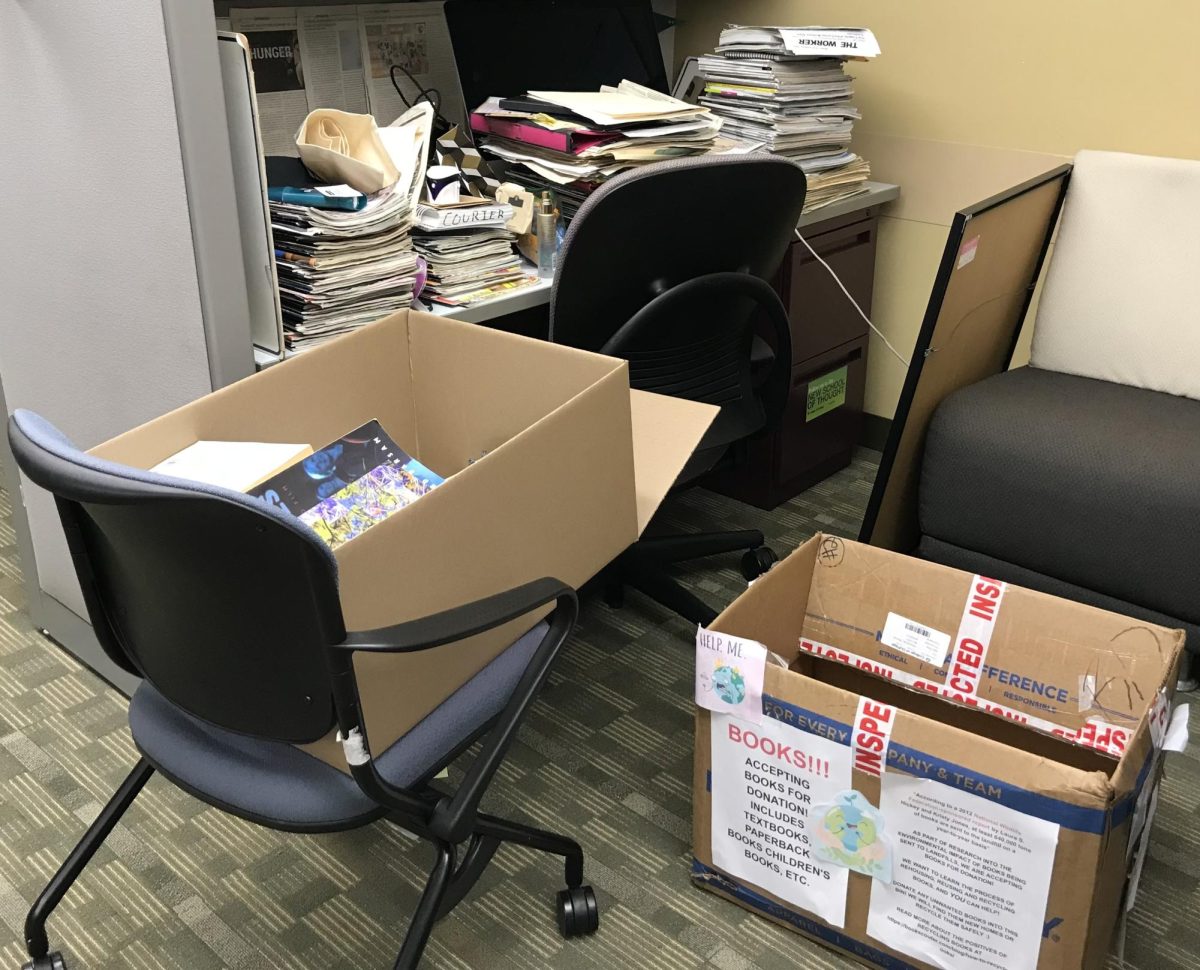As another year winds down, many of us are facing the end-of-the-semester dilemma: what should we do with our old textbooks? Or perhaps you are planning to move in the new year and have been dreading an unavoidable confrontation with the box of dust-covered books you shoved to the back of your closet last time you cleaned. Whether you are battling through clutter or joyfully dumping out the contents of your backpack, you may have found yourself with stacks of books and no idea what to do with them. How can you responsibly dispose of them?
When you face this box on your checklist, don’t procrastinate or toss them in the trash. Don’t let your old books rot in storage or join their unfortunate friends in a landfill— donate to our book drive instead!
For the final project in our Environmental Biology class, I’ve partnered with my classmates Liz Michael and Ammu Khan to tackle this issue head-on by are collecting gently used books for donation and unsellable books for recycling until Dec. 12. With the support of the remarkable team at School & Community Assistance for Recycling and Composting Education (SCARCE), the goal of our book drive is ambitious but clear: promote literacy, reduce paper waste and contribute to a more sustainable world. Our initiative isn’t just about recycling books; it’s about creating a positive impact and spreading awareness about the responsible disposal of books.
But why is book recycling so important? Recycling a book can prevent it from ending up in a landfill, where it can produce methane, a greenhouse gas that is 10 times as potent as carbon dioxide. Books, despite being made of paper, are not innocent when left to decompose in landfills, releasing harmful chemicals and further polluting our environment. According to the Environmental Protection Agency (EPA), about 320 million books end up in a landfill every year. Imagine the environmental toll of throwing away these books and the beneficial impact you can have by donating them instead!
A donation of a textbook or old picture book might seem insignificant, but multiplied by the number of students on a college campus that could potentially contribute, the impact is substantial. According to Treehugger, a website dedicated to making environmental sustainability accessible, recycling one ton of paper can save 17 trees, 7,000 gallons of water, 380 gallons of oil, a staggering 4,000 kilowatts of energy, and reduce carbon dioxide emissions by 9 tons. This means that recycling a single book (assuming an average book weight of 0.2 kg, though textbooks often weigh more) can save about 2.8 kWh of energy and reduce carbon dioxide emissions by 0.018 tons. If we were able to donate 100 books, we would be able to reduce carbon dioxide emissions by more than a tenth of a ton!
But our book drive isn’t just about getting rid of old books and reducing paper waste – it’s about spreading the joy of reading and education around DuPage County. When you donate or sell your gently used books, you’re giving others a chance to dive into a good story or learn something new, especially for those who can’t afford brand-new books. You have the chance to pass on beloved stories (or loathed textbooks that may be better loved by someone else) and make sure everyone gets a shot at exploring new worlds and/or concepts through reading.
Don’t think of your old books as clutter; think of them as opportunities to share the love of learning with someone else!
But where will these books go? Before Dec. 14, we’ll be delivering them to SCARCE in Addison, a non-profit organization dedicated to environmental education. According to their website, they are actively involved in various initiatives, including a Reuse Center, recycling events, and offsite recycling programs. The organization focuses on diverting millions of books and supplies from disposal, directing usable items to their Reuse Center for teachers and non-profits, and recycling out-of-date or damaged items through specialized programs. We are planning to drop off all of the books we collect at their Reuse Center and will hopefully get to take part in the specialized recycling and donation processes.
But our book drive is only accepting donations for the next week. So, what if you miss the deadline? Consider selling your textbooks and other unwanted books online. They may fetch a good price and help pay for the textbooks you need next semester. Also, consider donating (particularly fiction books) to charities, community centers, libraries or schools.
By recycling and/or upselling books, you can not only declutter your space but also support a good cause and potentially make some extra cash. These small acts create a ripple effect, contributing to a more sustainable and resource-conscious approach to education. Each book can start a new chapter, not just in someone’s reading journey but also in the ongoing story of environmental sustainability and our mission to create a greener future.
As a community, we can continue making a positive impact by collectively participating in green initiatives and promoting sustainability on our campus. Whether it’s a recycling drive, tree-planting event, or environmental awareness campaign, every student’s active involvement will help contribute to an eco-conscious culture.
Remember, the power to make a difference is in your hands. Each book donated, each conversation sparked, and each mind influenced helps pave the way to a more sustainable and socially conscious future. Choose sustainability. Choose ecological accountability. Choose to be part of the solution. Let’s begin by turning the page on book waste and write a story of lasting impact, one recycled book at a time.
If you have books to donate, please contact [email protected] or stop by the newsroom at SSC 1220 to drop them off.
For more information on SCARCE and the items they accept, you can visit SCARCE’s website: Welcome – SCARCE.







